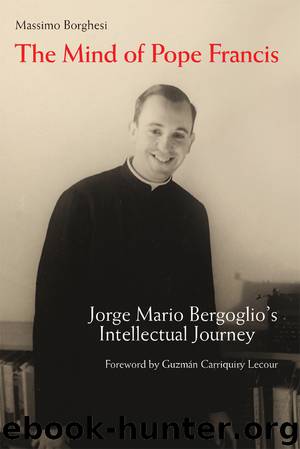The Mind of Pope Francis by Massimo Borghesi

Author:Massimo Borghesi [Неизв.]
Language: eng
Format: epub
Publisher: Liturgical Press
Published: 2018-08-23T20:00:00+00:00
Vatican II as the Overcoming of the Reformation and the Enlightenment
We have already considered the importance of Alberto Methol Ferré for Bergoglio. The journals he led—Nexo, Vispera, and then Nexo again—profoundly influenced Catholic intellectuals throughout Latin America. In their pages, Methol developed his vision of an “ecclesial geopolitics” dominated by the church and Latin America,1 as two poles in tension, united and distinct at the same time. As he wrote in 1975, he wished to provide “a reflection that runs between two poles, Latin America and the church, in order to define the current ‘configurations’ that both have taken. It is a compelling problem, because we are Latin Americans engaged in the church and Christians engaged in Latin America. But one pole cannot intersect with the other pole and its conflicts without bringing its own along with it. We are engaged in the conflicts of the two poles, the ecclesial and the secular, which interpenetrate. We cannot be engaged in one without also being engaged in the other.”2 It is impossible to separate the poles, he said, because both have the same starting point: the people. He wrote:
[The church is] a universal people “within” peoples. It is a universal people, because it is the people of God, living in the midst of every nation, encountering all manner of opposition, until the final day of history. Without a home of its own, it is the most fragile of peoples and also the strongest, because it resides in the power of the love of Christ, of God. The mystery of the church is founded on the omnipotence of the crucified God who assumed our weakness in order to redeem us, without a homeland of its own on the earth, but residing within peoples and states, submissive to them, sharing their vicissitudes and traditions, and yet with a consistent, ecclesial tradition of its own, because the church is itself a people. The church assumes the traditions of the peoples that make it up and nourishes itself with them, but at the same time it develops a tradition of its own, different from that of all the peoples of the world, and penetrates them from “outside” to constitute itself “inside” and change the ecclesial “outside” to the “inside” of the people of the world.3
Download
This site does not store any files on its server. We only index and link to content provided by other sites. Please contact the content providers to delete copyright contents if any and email us, we'll remove relevant links or contents immediately.
Resisting Happiness by Matthew Kelly(3341)
The Social Psychology of Inequality by Unknown(3031)
Day by Elie Wiesel(2786)
Designing Your Life by Bill Burnett(2748)
The Giving Tree by Shel Silverstein(2345)
Human Design by Chetan Parkyn(2075)
The Supreme Gift by Paulo Coelho(1983)
Angels of God: The Bible, the Church and the Heavenly Hosts by Mike Aquilina(1969)
Jesus of Nazareth by Joseph Ratzinger(1811)
Hostage to the Devil by Malachi Martin(1803)
Augustine: Conversions to Confessions by Robin Lane Fox(1774)
7 Secrets of Divine Mercy by Vinny Flynn(1747)
Dark Mysteries of the Vatican by H. Paul Jeffers(1723)
The Vatican Pimpernel by Brian Fleming(1703)
St. Thomas Aquinas by G. K. Chesterton(1635)
Saints & Angels by Doreen Virtue(1606)
The Ratline by Philippe Sands(1580)
My Daily Catholic Bible, NABRE by Thigpen Edited by Dr. Paul(1503)
Called to Life by Jacques Philippe(1481)
